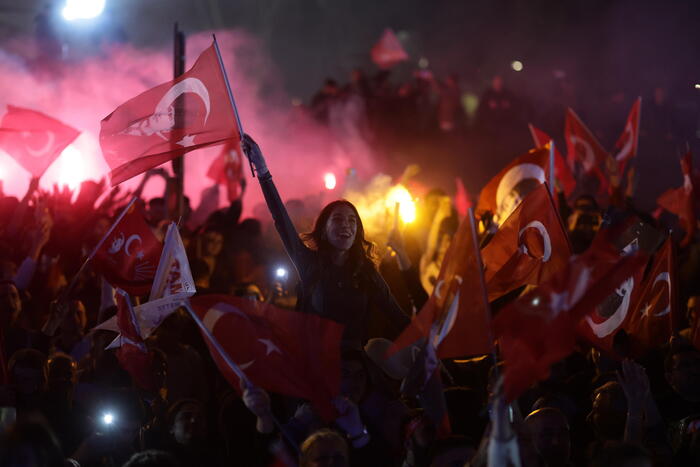Hakan Demir has not offended anyone. He has neither called for violence nor hatred against dissidents. Nevertheless, the journalist of the left-wing Turkish newspaper "BirGün" was temporarily arrested this week for "sedition". Demir had been critical of Turkey's military operation in Syria.
The Turkish military has fought since Wednesday in northeastern Syria against the Kurdish militia YPG, the strongest military force of the "Syrian Democratic Forces" (SDF). President Recep Tayyip Erdogan calls the operation a "source of peace".
He refuses any criticism of the operation. The authorities are investigating several dozen opponents of the war, including the leaders of the pro-Kurdish party HDP, Pervin Buldan and Sezai Temelli.
Erdogan's offensive causes indignation worldwide
Erdogan has threatened for months with an offensive against the YPG in Syria. But only after US President Donald Trump guaranteed him in a telephone conversation last Sunday to immediately withdraw American soldiers from the region, Turkish troops advanced.
Since then, the Turkish military has been bombarding the Syrian towns Tal Abjad and Ras al-Ain. Conversely, grenades from Syria hit the Turkish towns of Akcakale and Ceylanpinar. Civilians were killed on both sides of the border.
MIRROR ONLINE
Turkey moves to YPG's position in Syria - where and when does the offensive end?
Erdogan's offensive causes indignation worldwide. Norway has suspended arms sales to Turkey, US politicians are preparing sanctions, France is also considering sanctions. Surprisingly, however, the Turkish military mission does not come.
Obama and Trump assured Erdogan that the alliance with the YPG was purely tactical
Since the US declared the YPG 2014 an ally in the fight against the terrorist militia "Islamic State" (IS), Erdogan is running against this cooperation storm. His government considers the militia a Syrian offshoot of the banned Kurdish Workers' Party PKK, which has been engaged in armed struggle against Turkey for decades.
Trump's predecessor Barack Obama was well aware of Turkey's concerns. However, he saw no other way to stop IS's advance than to work with the YPG. Obama did not want to send his own ground troops to Syria, and cooperation with the Free Syrian Army (FSA), as suggested by Ankara, was too risky for his government due to the alleged ideological proximity of some FSA fighters to the IS. For the liberation of the IS stronghold Rakka Trump further upgraded the YPG 2017.
Obama, like Trump, assured Erdogan that the alliance with the YPG was purely tactically motivated and time-limited. But while the YPG established a de facto state in northeastern Syria, Erdogan increasingly lost patience. The abrupt withdrawal of troops from the Americans now leads precisely to the scenario that US military strategists always wanted to avoid: Turks and Kurds are fighting each other.
If Turkey attacks Kobane, a bloody guerrilla war threatens
Erdogan wants to bring first the approximately hundred kilometers long stretch of land between valley Abjad and Ras al-Ain under Turkish control. Many Arabs live in the region, which is why Ankara expects only limited resistance there. Fights for major Kurdish cities like Kobane or Kamischli, where a bloody, protracted guerrilla war is expected, are likely to be much more cruel.
more on the subject
So far Erdogan ignores all warnings of a bloodbath. He wants to create from the river Euphrates in the south to the Iraqi border in the north, a 500-kilometer-long and 30-kilometer-deep buffer zone, in which up to two million Syrian refugees from Turkey are to be settled.
There are two blueprints for his project:
- In 2016, the Turkish military captured the Syrian city of Jarabulus from IS,
- 2018, the Syrian province of Afrin from the YPG.
Since then, Turkey has acted as an occupying power in both regions, establishing its own administration and having local security forces. However, the model applied there is unlikely to be transferred to northeastern Syria:
- The region is much bigger
- the population is heterogeneous, unlike for example in Jabalabulus.
It is unclear how the Turkish government, even in the event of a successful military intervention, would like to establish stability and security there in the long term. Gerry Simpson of Human Rights Watch warns of chaos. "There are many examples in history where security zones have become deadly traps."








